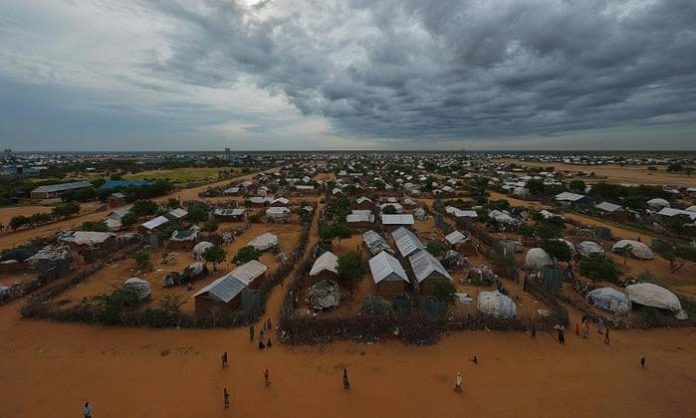Facebook Twitter (X) Instagram Somali Magazine - People's Magazine
The election of Donald Trump as the next U.S. president has sent ripples far beyond American borders, with Somali refugees in Kenya’s Dadaab refugee complex bracing for what many fear will be a renewed travel ban targeting Muslim-majority countries. Trump’s prior presidency saw the implementation of a controversial “Muslim travel ban,” which barred entry to the U.S. from countries including Somalia, Iraq, and Syria, among others. Refugees now worry history may repeat itself as Trump prepares to take office again on January 20.
Dadaab, one of the largest refugee complexes globally, shelters over 400,000 people fleeing conflict and climate crises. For many Somali refugees, resettlement in the United States represents a beacon of hope—a chance to rebuild their lives, access education, and provide opportunities for their children. However, with Trump’s rhetoric about restricting refugee admissions and targeting “terror-infested” regions, that hope is now tinged with uncertainty and fear.
Trump’s previous ban, upheld by the Supreme Court and later expanded to include 11 nations, drastically reduced refugee admissions. Numbers dropped from nearly 85,000 under Barack Obama in 2016 to a record low of 11,814 by 2020. Although the Biden administration reversed the ban and restored refugee quotas, many in Dadaab worry Trump’s return could reverse the progress made.
In interviews conducted by Radio Gargaar, a community station based in Dadaab, refugees shared their apprehensions. Many spoke of “buufis,” a Somali term describing the extreme anxiety caused by years of waiting for resettlement. For some, this anxiety has led to mental health crises, while others have turned to dangerous alternatives, such as attempting illegal migration to Europe or the Gulf states through perilous routes.
One refugee, Muscab Faarax Jamac, described the anguish of waiting 14 years for resettlement. “If what I’ve been waiting for is denied or rejected, I may end up doing anything that comes to mind, like taking the risk of tahriib,” he said, referring to the dangerous journey many refugees undertake in hopes of reaching safer countries.
The psychological toll of the long waiting process has left lasting scars on Dadaab’s residents. “Some people lost their sanity and never recovered to this day,” said Saynab Adan Hussein. “You’ll find them collecting garbage because they had so much hope, so much ambition, only for it to be crushed.”
Refugees also pointed out the broader implications of a renewed ban. Aisha Mohamed described Dadaab as an “open-air prison” where freedom of movement is severely restricted. She emphasized the opportunities offered by countries like the U.S., Canada, and Australia, where refugees can use their skills, gain education, and build stable futures for their families.
While many expressed fear and frustration, others appealed directly to Trump to reconsider his stance. “We are not dangerous people. We are refugees. America has always been known to take in refugees,” pleaded Fadumo, another Dadaab resident. “We request Trump to welcome us with open arms.”
However, Trump’s statements during his campaign suggest a hardline stance is likely. At a recent event in Washington, he vowed to reinstate the travel ban, saying, “We’re not taking them from infested countries.” Such language has sparked deep anxiety among Somali refugees, who view America as their “official country” outside Africa, according to one interviewee.
Ali Cigaal highlighted the consequences of despair among the camp’s youth. He noted that a nearby football ground, once bustling with 25 players, now has only five left. “The rest have done tahriib,” he said, underscoring the life-threatening risks many are willing to take when hope fades.
Despite the uncertainty, some residents remain resolute, placing their faith in divine intervention. “Whatever good God has written for you, you will get it,” said Fadumo. “The people shouldn’t place their faith in human beings.”
As Trump prepares to assume office once more, the world watches to see how his policies will impact vulnerable communities like those in Dadaab, where hope is a fragile but enduring thread.

